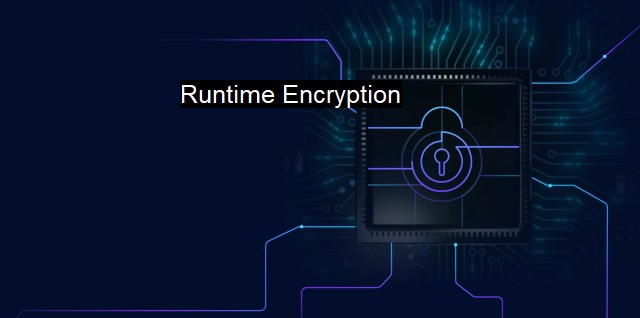What is Runtime Encryption?
Introducing the Power of Runtime Encryption: Safeguarding Sensitive Data in Antivirus Software, IoT Devices, and Critical Infrastructure Systems
Runtime Encryption is a critical technology that offers an additional level of data protection over and above other cybersecurity systems. It specifically relates to the encrypting, or protecting, of data during execution or while it is in use. This is contrasted with other kinds of encryption, which typically safeguard data either at rest (i.e., when it is stored within a system) or in transit (such as when it is moved between different points in a network).Runtime encryption being a more sophisticated technique has unique merits when it comes to providing protection in the highly engaging and complex world of cybersecurity. the function of Runtime Encryption is to ensure that data remains encrypted not just when it is resting or in transport mode, but also when it is being interactively accessed by the user. The way this method secures data gives confidence that even if unauthorized entities gain control over the system, they can't do anything with the encrypted data.
Historically, to understand and maneuver data, we needed to convert it into plain, unencrypted text. But with Runtime Encryption, we can now manage a more secure framework where data remains in its encrypted form at all times, even while being processed. While regular encryption methodologies still offer crucial layers of protection, this continuous process of decrypting data opens websites, applications, and systems to potential infiltration and exploitation during the moment of work.
An excellent comparison to carry through the idea of runtime encryption would be antivirus software. In simple terms, just as antivirus uses heuristic and signature-based scanning to analyze if an entity is malicious before it can induce damage, Runtime Encryption operates to continuously keep the data encryption ‘on’ when it is being interacted with so no misuse can occur.
In terms of its applicability, Runtime Encryption is used in cloud computing and other open environments where data sharing and interaction happen quite frequently. The cloud, with its immense data sharing capacity, is most susceptible to security threats. Runtime Encryption is therefore regarded as an effective defense mechanism as it can control and restrict access to sensitive data throughout its lifecycle.
Employing the concept of runtime encryption to protect against cyber threats can have inherent complexities. Some argue it can affect application performance considering the ongoing encryption process and deceleration during working hours. More sophisticated approaches such as Intel SGX (Software Guard Extensions) attempt to mitigate this problem; also raise new exploits.
Further, configuring and managing this type of encryption requires a high level of technical expertise. Correct configuration is paramount, and slight misconfigurations can lead to data exposures. On the other hand, not implementing it can be costly in the long term when thinking about potential loss of invaluable sensitive information.
Despite the potential issues, it's becoming clear, in a world connected by information networks, the value of data and the potential damage that could be dealt without suitable data protection outweighs these concerns. Thus the adoption of higher levels of security such as Runtime Encryption seems logical. Runtime Encryption gives tackling cyber threats and mitigating exploitations an additional layer of armor and assurance, making IT environments more secure and minimizing the risk of data breaches and malicious encroachments. As with all cyber defenses, the key to maximizing its advantages lays in expert implementation and governing its use wisely.

Runtime Encryption FAQs
What is runtime encryption in cybersecurity?
Runtime encryption is a technique used to encrypt data while it's being processed by an application in real-time. This makes it difficult for attackers to intercept and steal sensitive information.Why is runtime encryption important in antivirus software?
Runtime encryption is important in antivirus software because it helps prevent malware from being detected and analyzed by security programs. By encrypting the code and data used by an application, runtime encryption makes it more difficult for attackers to reverse-engineer and understand how the malware works.How does runtime encryption work?
Runtime encryption works by encrypting the data and code used by an application as it's being processed. When the application needs to access the data or code, it's decrypted on-the-fly and made available to the application. This ensures that the data and code are always encrypted when they're not actively being used, which helps protect them from attacks.Can runtime encryption be bypassed by attackers?
While no security technique is foolproof, runtime encryption can make it much more difficult for attackers to steal sensitive information or execute malicious code. However, if an attacker can gain access to the unencrypted data or code while it's in memory, they may be able to bypass runtime encryption. Therefore, it's important to have a multi-layered approach to cybersecurity that includes other security measures in addition to runtime encryption.| | A | | | B | | | C | | | D | | | E | | | F | | | G | | | H | | | I | | | J | | | K | | | L | | | M | |
| | N | | | O | | | P | | | Q | | | R | | | S | | | T | | | U | | | V | | | W | | | X | | | Y | | | Z | |
| | 1 | | | 2 | | | 3 | | | 4 | | | 7 | | | 8 | | |||||||